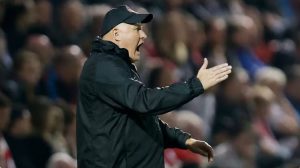“Hey, look at this tiny Cox! Look at this tiny Cox! Look at this tiny Cox!”
Between 2010 and 2017, there’s a good chance you heard Leyton Orient supporters belting out that song from the terraces if you ever visited Brisbane Road.
They were not only proud and boisterous about their small stature, but they were also playing music for their cunning little playwright who had kept everything moving for his entire six-and-a-half years in East London.

After being released by Brighton and Hove Albion, Dean Cox came to Orient with a mission to accomplish. He left the O’s as a club hero, experiencing many magical moments along the way.
Dean Cox fails to impress Gus Poyet at Brighton and Hove Albion
Cox rose through the ranks of the Sussex team and was a regular in the early years of the Seagulls’ tenure, making over 150 appearances in all competitions over six years.
The 5′ 4in technician more than proved coaches of the past wrong by succeeding at Brighton, a League One team at the time, despite their claims that he was too small to play professionally.
The team that played their home games at the Withdean Stadium, which has a 400-meter running track encircling the pitch, was not the well-equipped squad that we see adorning the Premier League of today.
Albion meant the world to Cox at the time because he had grown up there, and the opportunity to play for the club he had always loved was a dream come true.

Albion had some future stars with Glenn Murray and Bradley Johnson among their ranks, and Cox was the key player connecting the attack and midfield. However, when Gus Poyet took over as manager on the south coast, things went south quickly.
Cox, a player who would have given his all to play in the blue and white shirt, wasn’t part of the Uruguayan’s plans to immediately add his own stamp to the team he inherited.
The playwright explained in an interview with Sussex Live that it was understandably difficult to hear that you aren’t well enough to play for your boyhood club: “Gus Poyet made it quite clear I wasn’t in his plans.” At the time, that was pretty soul-destroying. I had devoted myself fully since I was six years old. It was difficult to accept that, at 22/23, I wasn’t good enough, even though I felt I was.
I began playing close to the beginning of the season, and after Gus entered the game, I continued to play for a while until I eventually found myself on the bench and eventually in the stands. You can tell the writing is on the wall when that occurs.
“I recall a sincere discussion. He informed them to look for another place to play and that he would not be renewing the contract. At the time, it was very difficult to accept.
“It was the dream to play for Brighton. I only wanted to do that. The taking it away was extremely difficult. I was really offended by it. My dream had vanished with it. Refocusing allowed me to consider playing somewhere else.
Brighton and Poyet’s decision would play into Orient’s hands though, with a soon-to-be club legend linking up with a familiar face when he made the move to the capital.
Russell Slade reunion reaps rewards for Dean Cox and Leyton Orient
During Cox’s tenure with the team, Russell Slade was Albion’s manager, and he provided the midfield player with the opportunity to demonstrate his skills on the biggest platform.
The former manager of Yeovil Town [pictured] oversaw a stunning comeback with the Seagulls in the 08–09 season, overcoming an eight-point deficit with seven games left to keep them in the third division and essentially altering the club’s history forever.
Cox was essential to those endeavours, so it was only a matter of time until his contract with Albion expired for him to rejoin his former boss at Brisbane Road, and the two hit the ground running.
Less than two months after leaving the club, he scored the first goal against Brighton in the EFL Trophy, demonstrating to them that he meant business with his 28 goal contributions in his debut season.
While Poyet led the Seagulls to promotion in the ensuing season, it also proved to be the catalyst for Cox’s development, as he embraced his new environment by dishing out an amazing 17 assists during the campaign.

Orient supporters watched in amazement as the mini-magician pulled something magical out of his hat each and every week, with the O’s appearing to be on the rise as a result. He had a weaving run, amazing vision, and an eye for the spectacular.
The couple’s marriage would reach its zenith during the 2013–14 season, which ended in heartbreaking disappointment despite the team’s prolonged dominance in League One before losing to Rotherham United in the playoff final.
How different things could have been, as Orient found themselves fighting for a place in the Football League in the space of three years following that fateful day at Wembley, all thanks to the appalling ownership of Francesco Becchetti.
Despite his best attempts to try to stabilise things on the pitch, Cox stayed until that final, fateful season as things at the club grew worse.

Things became increasingly worse off the pitch as a result of the uncertainty surrounding the club; after the transfer window closed, the ownership released him from his contract, which prevented him from joining another EFL team.
The player was leaving on bad terms after more than 250 games for a team that had adopted him. At the time, he stated, “I didn’t really want to leave but, circumstances being what they were, I felt like I had no choice.”
“We had decided to part ways, having reached that conclusion. For legal reasons, I really can’t go into too much detail.
When Orient lost one of their key marksmen, they collapsed and had to fight their way back into the Football League, while Cox went on to play for Crawley Town.
Orient and Cox were a match made in heaven for a while, and Brisbane Road will always remember the fun times he provided them with along the way, even though they ended their relationship poorly.
Leave a Reply